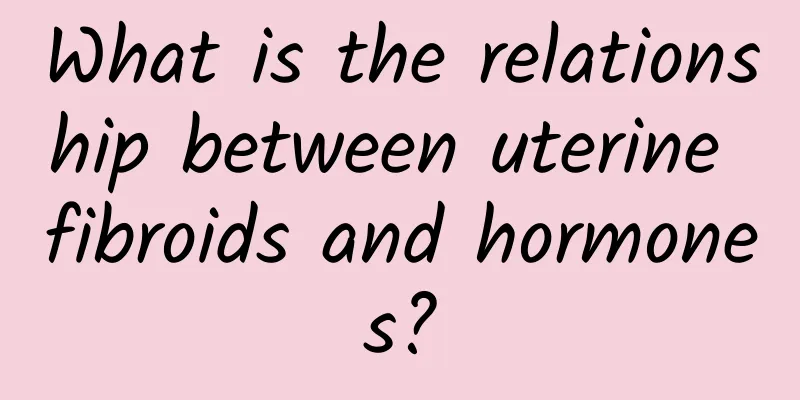What is the relationship between uterine fibroids and hormones?

|
What is the relationship between uterine fibroids and hormones? Uterine fibroids are common benign tumors in gynecology, and hormones play an important role in women's physiological processes. Therefore, exploring the relationship between uterine fibroids and hormones is of great significance for understanding the pathogenesis of uterine fibroids and the importance of hormone regulation. 1. Hormone dependence of uterine fibroids Uterine fibroids usually occur in women of childbearing age, and the incidence of uterine fibroids decreases significantly after menopause. This phenomenon suggests that uterine fibroids are related to hormones. In fact, uterine fibroid cells are often rich in estrogen receptors and progesterone receptors, which indicates that hormones may play a certain regulatory role in the occurrence of uterine fibroids. 2. The influence of estrogen Estrogen plays an important role in women's physiological processes. It can stimulate the proliferation of the endometrium and promote the growth of the myometrium. However, too high estrogen levels may lead to the occurrence of uterine fibroids. Studies have found that estrogen can stimulate the proliferation and growth of uterine fibroid cells and increase their size. Therefore, maintaining a proper estrogen balance is important for alleviating the symptoms of uterine fibroids and controlling their growth. 3. The role of progesterone Progesterone is a metabolite of estrogen, and its level usually increases in the second half of the menstrual cycle. Progesterone also has a certain effect on the occurrence and growth of uterine fibroids. On the one hand, progesterone can inhibit the proliferation of uterine fibroid cells by inhibiting estrogen synthesis and estrogen receptor expression; on the other hand, progesterone reduces the blood supply of uterine fibroid cells by regulating angiogenesis and vascular permeability, thereby inhibiting their growth. 4. Hormone Regulation Therapy Because uterine fibroids are closely related to hormones, hormone regulation therapy has become a common treatment method. Hormone regulation therapy changes hormone levels by administering estrogen antagonists or progesterone analogs, thereby inhibiting the growth of uterine fibroids and alleviating their symptoms. However, hormone regulation therapy is not suitable for all patients with uterine fibroids. Whether to use this treatment method depends on the patient's specific situation and symptoms. Uterine fibroids are closely related to hormones. Estrogen can promote the growth of uterine fibroids, while progesterone has the effect of inhibiting uterine fibroids. Hormone regulation therapy is a feasible treatment method, but it needs to be decided based on the patient's condition. Further research will help reveal the relationship between uterine fibroids and hormones and provide more effective methods and strategies for clinical treatment. |
<<: What causes uterine fibroids? What are the symptoms of uterine fibroids?
>>: What are special types of uterine fibroids?
Recommend
What are the common harmful consequences of hyperprolactinemia?
Hyperprolactinemia is caused by internal and exte...
Healthy and slim! 4 nutritious diet recipes for weight loss
These four nutritious weight loss recipes are des...
How to calculate your menstrual cycle
How to calculate the menstrual cycle? The menstru...
It’s not effective just by holding on for a long time! The effect of 5 minutes of stick type is almost the same as 1 minute
This article is a collection of the observations ...
Bad living habits can easily lead to cervicitis in your life
According to surveys, cervicitis has become a com...
Playing badminton, sudden stop, jump smash... learn how to prevent sports injuries
Although it may seem like badminton players find ...
Core exercises can help relieve stress! Exercise can activate the core and impact the adrenal medulla
Since most people are often in a state of mild an...
What are the effective care measures for pelvic inflammatory disease?
How to take good care of pelvic inflammatory dise...
The main causes of cervical erosion
Cervical erosion is a common gynecological diseas...
Western medicine treatment of bacterial vaginosis
Western medicine treatment 1. Oral medication the...
The test standard for the conditional lifting of the ban on the use of linalool in the United States is 10ppb
The Department of Health officially announced tod...
How to correctly understand the second degree of cervicitis
Many patients with cervicitis do not actually kno...
Will chronic cervicitis cause back pain in women? The four major symptoms of chronic cervicitis in women are more obvious.
Chronic cervicitis will cause symptoms of low bac...
What are the effective ways to take care of ectopic pregnancy?
The occurrence of ectopic pregnancy is very commo...
What are the thorough examination methods for pelvic peritonitis?
Patients with pelvic peritonitis should also pay ...









